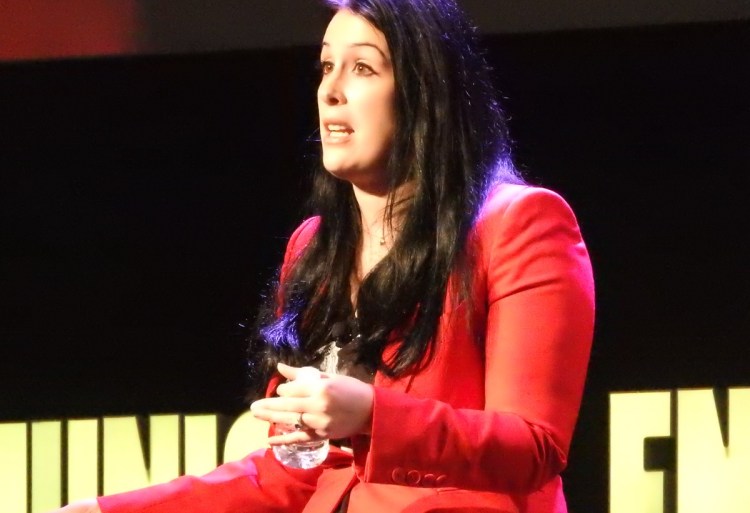LAS VEGAS — In 33 years of playing video games, writer Rhianna Pratchett has seen the value of story go through its own creative arc.
Back in the day, Pratchett noted, game guru John Carmack noted that story in games was as necessary as story in porn movies. Now, games like Rise of the Tomb Raider, which she co-wrote, are getting awards for writing accomplishments from the Writers Guild. (See our in-depth interview with Pratchett).
Pratchett spoke about this arc for narrative today at the DICE Summit, a game event in Las Vegas that brings the biggest companies and personalities in the blockbuster industry together. Storytelling is now seen as the distinguishing hallmark in tentpole games such as Naughty Dog’s The Last of Us and Irrational Games’ BioShock Infinite.
She started with a leg up in storytelling. She has been playing games since age 6, and she comes from a writing family. Her father was Terry Pratchett, the author of 41 Discworld fantasy novels and the writer of 70 books that sold more than 85 million copies.
Pratchett also picked up the ability to write, starting her career in video game journalism. She then shifted into writing scripts for games, starting with Beyond Divinity, a fantasy role-playing game from 2002. Her career took off when she wrote the story for Heavenly Sword, a Sony game that starred the a woman, Nariko.
She later moved on to the Overlord series and Mirror’s Edge. She was the lead writer on the widely acclaimed Tomb Raider reboot in 2013 and on the 2015 sequel Rise of the Tomb Raider. She also writes comic books (notably Mirror’s Edge for DC Comics and Tomb Raider for Dark Horse), film, and TV.
From that history, she has learned how story helps. The 2013 Tomb Raider has sold 8.5 million copies, and it was the fastest-selling game in the history of the Lara Croft series.
Professional writers used to be a rarity when she started. They became popular when Hollywood started moving into video games, but the results weren’t always that good. Movie games got a bad reputation and players reacted badly to titles with too many cinematics, or film-like sequences, and not enough playing.
“Hollywood didn’t work out too well,” Pratchett said. “But games are not putting a character’s story and journey at the front and center, and it was part of why Rise of the Tomb Raider did well.”
But writers can’t control everything in games. They are just part of the hierarchy of people who put games together. They have to deal with the special rules sets and restrictions of games.
“We must recognize our own uniqueness and power” at conveying story to audiences in games, Pratchett said. “We need to grow our own writers who are specialized in games and foster them in our own industry.”
One of the biggest problems in games used to be that the writers were often hired too late, when it was too expensive to make a major overhaul in the direction of a game.
“Writers need to be engaged with their team, not kept on the outside,” Pratchett said.
With the Overlord series, Pratchett worked directly with game level designers, telling them story elements that would unfold in their levels, while the level designers told her about the mechanics, such as boss fights, that would happen in the level.
In bigger games, such as Rise of the Tomb Raider, Pratchett was a freelance contributor who worked with a narrative designer on staff. In that case, the narrative designers communicated with the rest of the team and “did the fighting for me.”
“We’re in this together,” she said. “Writers need to help engage the rest of the team in the story. Story flows through everything” from the animations to the world to the scenery.
Right now, she’s working on scribing duties for Warner Bros. and has several film projects and a TV series in the works. Here’s an edited transcript of our interview.
“To tell better stories, we must all become better storytellers,” Pratchett said.
VentureBeat's mission is to be a digital town square for technical decision-makers to gain knowledge about transformative enterprise technology and transact. Learn More



